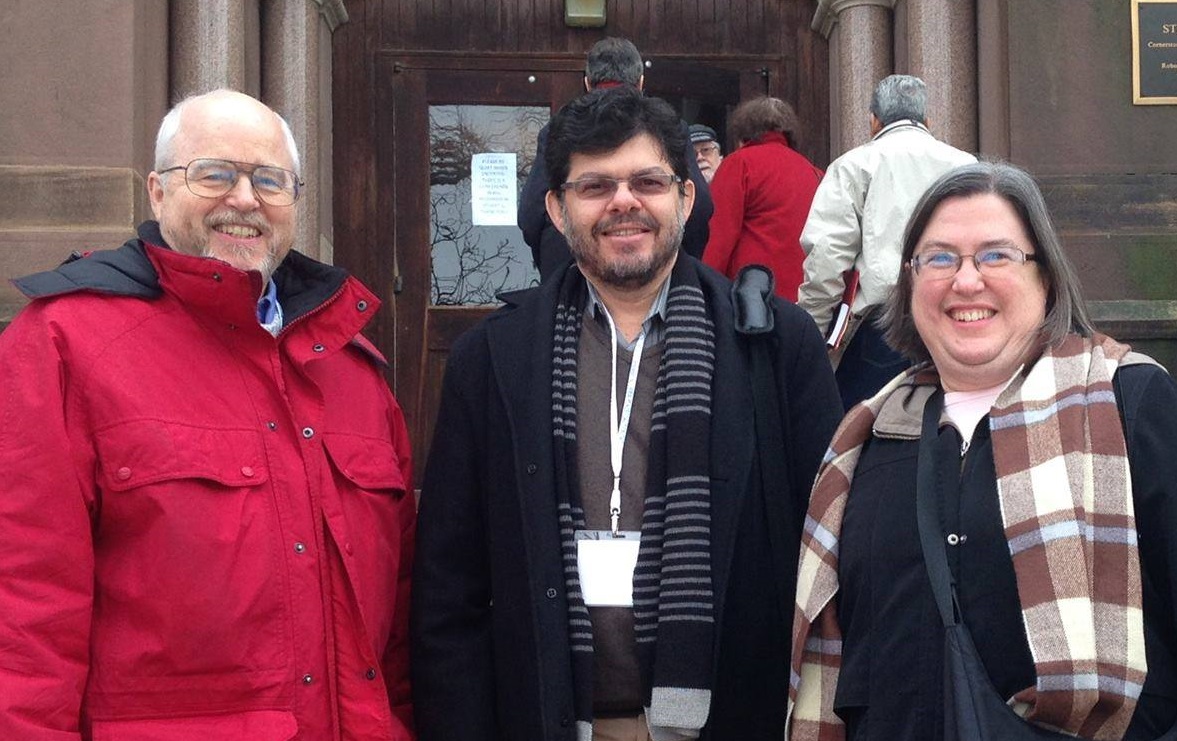By Bob Allen
One of more than 150 religious leaders who drafted a statement opposing the use of lethal drones by the United States military said Feb. 11 it’s an issue that more Baptists should care about.
Carol Blythe, past president of the Alliance of Baptists, said in an Alliance blog that she and fellow Alliance members Raimundo Barreto and Rick Goodman hope to develop church study resources based on insights they received at the Interfaith Conference on Drone Warfare held Jan. 23-25 at Princeton Theological Seminary.
“The way the U.S. government policy uses drone strikes for targeted killing without any due process — not to mention the large number of innocents killed or crippled in the process — is unacceptable from any perspective,” said Blythe, a member of Calvary Baptist Church in Washington.
 Ministers, priests, imams, rabbis and other faith leaders at the conference said that drone strikes, promoted by politicians as a way to kill terrorists before they kill us while keeping U.S. soldiers out of harm’s way, in reality make war too remote and easy, increasing the likelihood of military action and endangering innocent civilians.
Ministers, priests, imams, rabbis and other faith leaders at the conference said that drone strikes, promoted by politicians as a way to kill terrorists before they kill us while keeping U.S. soldiers out of harm’s way, in reality make war too remote and easy, increasing the likelihood of military action and endangering innocent civilians.
Bishop Richard E. Pates of the Catholic Diocese of Des Moines, Iowa, said in a paper that the “detached and asymmetric nature of a drone strike” raises ethical red flags.
“While using armed drones may feel cleaner than unilaterally invading a sovereign nation, their use makes it that much easier to engage in conflict,” Pates said. “There’s minimal risk to the operator when engaging the enemy, and that detachment is precisely what makes it so attractive to nations to employ drones in places where air defenses are minimal.”
Pates said using drones costs less than putting soldiers on the ground, making it easier for policymakers “to become lax in their decisions on waging war” in violation of Catholic Just War teaching of force being used as a last resort.
Susan Hayward, senior program officer at the United States Institute of Peace, said the message she often hears in Washington is if the U.S. does not respond militarily in the face of the suffering of others, it’s the equivalent of doing nothing.
“The faulty logic here is assuming that to respond to suffering in ways other than militarily, to respond in nonviolent actions that build peace, is the equivalent of doing nothing,” Hayward said.
Her denomination, the United Church of Christ, identifies as a “Just Peace” church, seeking to address the root causes that breed violence such as inequality, environmental degradation, cultural prejudice and poverty in lieu of war on the path toward sustainable peace.
Susan Brooks Thistlethwaite, professor of theology at Chicago Theological Seminary, said the use of drones is part of a larger “strategic incoherence” that is harmful to U.S. foreign policy.
Thistlethwaite, a UCC minister, said the current drone policy “is effectively driving our foreign policy in a war for the sake of war direction,” is “remarkably ineffective,” “dangerously destabilizing and chaotic” and likely illegal according to international law.
She said it also contributes to blowback in the form of terrorism such as the attack on the Paris headquarters of the satirical newspaper Charlie Hebdo as revenge for the newspaper’s repeated publication of cartoons depicting the Prophet Muhammad.
Thistlethwaite said it is unclear how much the attack by the Yemen-based branch of al Qaeda was motivated by the fact that its leader was killed in a U.S. drone strike in southern Yemen in September 2011.
“This is war today,” she said. “The whole world is a potential battlefield and the goal is to blow people apart from the sky.”
Conference participants issued a seven-point statement calling on the Obama administration “to immediately halt targeted lethal drone strikes.”
They urged the White House to be transparent and accountable about past use of drone warfare and called on Congress to repeal the 2001 Authorization for the Use of Military Force that is used as legal justification for drone strikes.
They asked Obama to rescind the authority of government agencies and contractors to use weaponized or lethal drones, called for an independent study on the impact of their use and urged the U.S. to pursue a global ban on autonomous weapons.
“We call on our leaders to take us off the path of unending war by implementing these recommendations,” the faith leaders said. “As people of faith, we advocate the rigorous pursuit of Just Peace, based on upholding dignity and human rights for all, with resources dedicated to this alternative at a level matching that spent on the current drone warfare program.”
